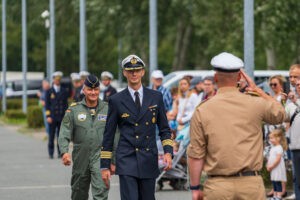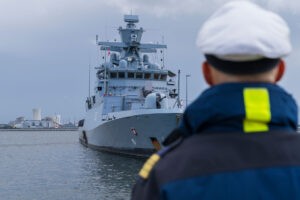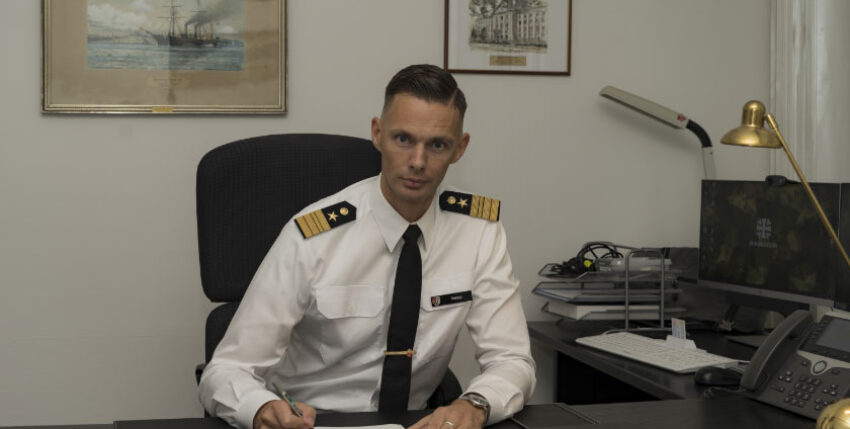In September 2021, Frigate Captain Kenneth Harms took command of the 1st Corvette Squadron in Warnemünde. Now he is turning his attention to new tasks. In an interview with marineforum, Harms summarises his time in Warnemünde.
Your squadron is developing, what will you remember fondly and what worries you?
First and foremost, I think back to what constitutes the core responsibility of a squadron commander. I was allowed to be at sea with my crews, accompany training sections and lead tactically. I was able to pursue all efforts, right down to the last consequence, to ensure that the Sea Falcon drone was reconnoitred and the RBS 15 missile reached its intended target. Over the past two years, we have made good progress in terms of the operational readiness of the unit and achieving full operational readiness. Training time at sea is now a rare commodity. External control due to excessive bureaucracy is a defining feature. And from time to time, projects have fallen through at the last minute due to a lack of spare parts or because we were unable to equip all crews to go to sea together as a squadron.
Looking back, I am deeply impressed by the team spirit and the talent for improvisation shown by the people in the squadron to achieve the goals they set themselves.
Were you saddened or pleased when the last corvette for the time being returned from the Unifil mission at the end of last year?
In December 2022, after years of intensive use, the last corvette for the time being returned from Unifil deployment. The "break" has made it very clear to us that we have a very high price tag for our crews and the technical readiness level. Constant crew replacement on the platforms falls at our feet every day in terms of technical readiness. The permanent use of the weapon system off the coast of Lebanon also shows what the Corvette 130 was not designed for - without wanting to deny its relevance in terms of security and military policy. Further and advanced training fell by the wayside due to patrol duty in the Levant and increasingly dampened the morale of the troops. The efforts of the naval leadership to persuade the departmental command to take a break from operations were not without vehement persuasion. On behalf of my troops, I am very grateful to the inspector for this respite.

the commander of the fleet, Vice Admiral Frank Lenski
Not every commander can put new units into service during his term of office. Pleasing, but what other changes are there?
I would very much have liked to have seen the KÖLN corvette commissioned during my time in command. Even if it sounds like bitter irony, I very much hope that my successor will see the commissioning during his time at the helm of the squadron. In this context, I can say with a clear conscience that we in the squadron have done our homework. The Foxtrot crew is ready and would rather get started today than tomorrow. I fully understand that, as a public client, we don't always have to make compromises that are at the expense of operational capability. However, the industry is still nowhere near as far along as it promised us. The idea of a "small solution" favoured by the squadron and the project team at the Federal Office of Bundeswehr Equipment, Information Technology and In-Service Support can hopefully be implemented in the fourth quarter of 2023. This would mean that the KÖLN and possibly also EMDEN boats would be available to the crews, at least for role duty, until the industry has implemented the prototype of the deployment system. We would then at least have training platforms - albeit with restrictions.
How has the war in Ukraine affected you and how are your crews dealing with it? Has it affected your operations, your mindset, even from a tactical perspective?
Immediately after the Russian invasion of Ukraine, my squadron, especially the corvette ERFURT, found itself at the forefront of NATO. During the Cold Response exercise in northern Norway and later in the eastern Baltic Sea. I am extremely proud of the fact that the mindset in the heads of my subordinate men and women worked without a hitch. The crew delivered. That makes me proud and emphasises the cold start capability. In this context, however, we need to think more about the unity of platform and crew. Crews need to know their boat. The rotating crew model costs fighting power. In future, we will return to the fixed link between platform and crew. In addition, more time will be planned in future for achieving operational readiness. The operational readiness level Bravo, as instructed by the naval inspector, will once again be mandatory, even if this means deploying later.
The 1st Corvette Squadron will soon have ten units - when do you think we will be fully operational? Will that be feasible in terms of logistics and personnel?Until then, the unit will go through a short dry spell in terms of the availability of operational corvettes. The first batch will undergo hardware regeneration, while the units of the second batch will arrive on average two years later, i.e. not before 2024. The unit will grow from 500 to over 1,000 soldiers. The corvette weapon system offers the advantage of a small combat community that stands closely together. The Warnemünde location is also attractive, and a growing unit offers the prospect of regionalised deployment planning. Word is getting around that we are now doing more challenging things again than travelling to Cyprus for four months between two platform changes. All of this is attractive, especially for our existing staff, whom we must not forget in all of this. The problem is also that fewer and fewer personnel are fit and willing to go to sea. And that we have fewer and fewer tools at our disposal to reverse this trend.

How is the cooperation with the Baltic Sea countries Sweden and Finland developing?
Exceptionally good. The cooperation with our partner organisation, the Swedish 31st Corvette Squadron, is close and based on trust. We have focussed our cooperation on establishing common operational standards. This will now pay off when we also work together within NATO. Finland is pursuing a corvette construction programme and it is in our own best interests to assume joint responsibility for space in the Baltic Sea in close cooperation with the Finns.
What will you leave behind for your successor?
I belong to the dying breed of speedboat drivers and am very grateful that I was allowed to lead this corvette convoy as such. My successor has also learnt to drive a boat at high speed with 500 yards distance to the wingman. That is why I will leave him a bone. This not only stands for safe navigation, it should also encourage him to leave the office as often as possible and be at sea with his crews. I wish my successor the same fulfilling service as commander that I have had.
On 5 October, Frigate Captain Kenneth Harms hands over command of the 1st Corvette Squadron to Frigate Captain Marc Tippner.
Daniel Angres








